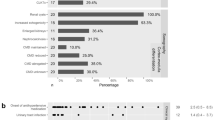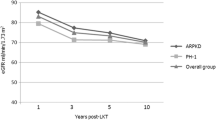Abstract
Background
Autosomal recessive polycystic kidney disease (ARPKD) is a rare ciliopathy characterized by congenital hepatic fibrosis and cystic kidney disease. Lack of data about long-term follow-up makes it difficult to discuss timing and type of organ transplantation. Our objectives were to evaluate long-term evolution and indications for transplantation, from birth to adulthood.
Methods
Neonatal survivors and patients diagnosed in postnatal period with ARPKD between 1985 January and 2017 December from 3 French pediatric centers were retrospectively enrolled in the study.
Results
Fifty patients with mean follow-up 12.5 ± 1 years were enrolled. ARPKD was diagnosed before birth in 24%, and at mean age 1.8 years in others. Thirty-three patients were < 1 year of age at first symptoms, which were mostly kidney-related. These most often presented high blood pressure during follow-up. Portal hypertension was diagnosed in 29 patients (58%), 4 of them with bleeding from esophageal varices. Eight patients presented cholangitis (> 3 episodes in three children). Liver function was normal in all patients. Nine children received a kidney transplant without liver complications. A 20-year-old patient received a combined liver-kidney transplant (CLKT) for recurrent cholangitis, and a 15-year-old boy an isolated liver transplant for uncontrollable variceal bleeding despite portosystemic shunt.
Conclusions
Long-term outcome in patients with ARPKD is heterogeneous, and in this cohort did not depend on age at diagnosis except for blood pressure. Few patients required liver transplantation. Indications for liver or combined liver-kidney transplantation were limited to recurrent cholangitis or uncontrollable portal hypertension. Liver complications after kidney transplantation were not significant.



Similar content being viewed by others
Data availability
Available.
Abbreviations
- ALT:
-
Alanine aminotransferase
- AP:
-
Alkaline phosphatase
- AST:
-
Aspartate aminotransferase
- CKD:
-
Chronic kidney disease
- CHF:
-
Congenital hepatic fibrosis
- CLKT:
-
Combined liver-kidney transplantation
- IRB:
-
Institutional review board
- GGT:
-
γ-Glutamyltranspeptidase
- eGFR:
-
Estimated glomerular filtration rate
- M/F:
-
Male/female
- IU:
-
International units
References
Guay-Woodford LM, Bissler JJ, Braun MC, Bockenhauer D, Cadnapaphornchai MA, Dell KM, Kerecuk L, Liebau MC, Alonso-Peclet MH, Shneider B, Emre S, Heller T, Kamath BM, Murray KF, Moise K, Eichenwald EE, Evans J, Keller RL, Wilkins-Haug L, Bergmann C, Gunay-Aygun M, Hooper SR, Hardy KK, Hartung EA, Streisand R, Perrone R, Moxey-Mims M (2014) Consensus expert recommendations for the diagnosis and management of autosomal recessive polycystic kidney disease: report of an international conference. J Pediatr 165:611–617
Srinath A, Shneider BL (2012) Congenital hepatic fibrosis and autosomal recessive polycystic kidney disease. J Pediatr Gastroenterol Nutr 54:580–587
Blyth H, Ockenden BG (1971) Polycystic disease of kidney and liver presenting in childhood. J Med Genet 8:257–284
Osathanondh V, Potter EL (1964) Pathogenesis of polycystic kidneys. Type 1 due to hyperplasia of interstitial portions of collecting tubules. Arch Pathol 77:466–473
Davis ID, Ho M, Hupertz V, Avner ED (2003) Survival of childhood polycystic kidney disease following renal transplantation: the impact of advanced hepatobiliary disease. Pediatr Transplant 7:364–369
Khan K, Schwarzenberg SJ, Sharp HL, Matas AJ, Chavers BM (2002) Morbidity from congenital hepatic fibrosis after renal transplantation for autosomal recessive polycystic kidney disease. Am J Transplant 2:360–365
Luoto TT, Pakarinen MP, Jahnukainen T, Jalanko H (2014) Liver disease in autosomal recessive polycystic kidney disease: clinical characteristics and management in relation to renal failure. J Pediatr Gastroenterol Nutr 59:190–196
Quintero Bernabeu J, Juamperez J, Muñoz M, Rodriguez O, Vilalta R, Molino JA, Asensio M, Bilbao I, Ariceta G, Rodrigo C, Charco R (2018) Successful long-term outcome of pediatric liver-kidney transplantation: a single-center study. Pediatr Nephrol 33:351–358
Rawat D, Kelly DA, Milford DV, Sharif K, Lloyd C, McKiernan PJ (2013) Phenotypic variation and long-term outcome in children with congenital hepatic fibrosis. J Pediatr Gastroenterol Nutr 57:161–166
Zerres K, Rudnik-Schöneborn S, Deget F, Holtkamp U, Brodehl J, Geisert J, Schärer K (1996) Autosomal recessive polycystic kidney disease in 115 children: clinical presentation, course and influence of gender. Arbeitsgemeinschaft fur Padiatrische, Nephrologie. Acta Paediatr 85:437–445
National Kidney Foundation (2002) K/DOQI clinical practice guidelines for chronic kidney disease: evaluation, classification, and stratification. Am J Kidney Dis 39(2 Suppl 1):S1–S266
Gunay-Aygun M, Font-Montgomery E, Lukose L, Tuchman M, Graf J, Bryant JC, Kleta R, Garcia A, Edwards H, Piwnica-Worms K, Adams D, Bernardini I, Fischer RE, Krasnewich D, Oden N, Ling A, Quezado Z, Zak C, Daryanani KT, Turkbey B, Choyke P, Guay-Woodford LM, Gahl WA (2010) Correlation of kidney function, volume and imaging findings, and PKHD1 mutations in 73 patients with autosomal recessive polycystic kidney disease. Clin J Am Soc Nephrol 5:972–984
Capisonda R, Phan V, Traubuci J, Daneman A, Balfe JW, Guay-Woodford LM (2003) Autosomal recessive polycystic kidney disease: outcomes from a single-center experience. Pediatr Nephrol 18:119–126
Burgmaier K, Kilian S, Bammens B, Benzing T, Billing H, Büscher A, Galiano M, Grundmann F, Klaus G, Mekahli D, Michel-Calemard L, Milosevski-Lomic G, Ranchin B, Sauerstein K, Schaefer S, Shroff R, Sterenborg R, Verbeeck S, Weber LT, Wicher D, Wühl E, Dötsch J, Schaefer F, Liebau MC (2019) Clinical courses and complications of young adults with autosomal recessive polycystic kidney disease (ARPKD). Sci Rep 9:7919
Bergmann C, Senderek J, Windelen E, Kupper F, Middeldorf I, Schneider F, Dornia C, Rudnik-Schöneborn S, Konrad M, Schmitt CP, Seeman T, Neuhaus TJ, Vester U, Kirfel J, Büttner R, Zerres K, APN (Arbeitsgemeinschaft für Pädiatrische Nephrologie) (2005) Clinical consequences of PKHD1 mutations in 164 patients with autosomal-recessive polycystic kidney disease (ARPKD). Kidney Int 67:829–848
Fan Y, Ye J, Qian L, Zhao R, Zhang N, Xue L, Qiao L, Jiang L (2019) Risk factors and outcomes of acute kidney injury in ventilated newborns. Ren Fail 41:995–1000
Hartung EA, Guay-Woodford LM (2014) Autosomal recessive polycystic kidney disease: a hepatorenal fibrocystic disorder with pleiotropic effects. Pediatrics 134:e833–e845
Gunay-Aygun M, Font-Montgomery E, Lukose L, Tuchman Gerstein M, Piwnica-Worms K, Choyke P, Daryanani KT, Turkbey B, Fischer R, Bernardini I, Sincan M, Zhao X, Sandler NG, Roque A, Douek DC, Graf J, Huizing M, Bryant JC, Mohan P, Gahl WA, Heller T (2013) Characteristics of congenital hepatic fibrosis in a large cohort of patients with autosomal recessive polycystic kidney disease. Gastroenterology 144:112–121 e2
El Mouzan MI, Abdullah AM, Al-Mofleh IA (2004) Yield of endoscopy in children with hematemesis. Trop Gastroenterol 25:44–46
Grimaldi-Bensouda L, Abenhaim L, Michaud L, Mouterde O, Jonville-Béra AP, Giraudeau B, David B, Autret-Leca E (2010) Clinical features and risk factors for upper gastrointestinal bleeding in children: a case-crossover study. Eur J Clin Pharmacol 66:831–837
Ling SC, Walters T, McKiernan PJ, Schwarz KB, Garcia-Tsao G, Shneider BL (2011) Primary prophylaxis of variceal hemorrhage in children with portal hypertension: a framework for future research. J Pediatr Gastroenterol Nutr 52:254–261
van Heurn LW, Saing H, Tam PK (2004) Portoenterostomy for biliary atresia: long-term survival and prognosis after esophageal variceal bleeding. J Pediatr Surg 39:6–9
Luoto T, Koivusalo A, Pakarinen M (2020) Long-term outcomes and health perceptions in pediatric-onset portal hypertension complicated by varices. J Pediatr Gastroenterol Nutr 70:628–634
Carbonell N, Pauwels A, Serfaty L, Fourdan O, Levy VG, Poupon R (2004) Improved survival after variceal bleeding in patients with cirrhosis over the past two decades. Hepatology 40:652–659
Mekahli D, van Stralen KJ, Bonthuis M, Jager KJ, Balat A, Benetti E, Godefroid N, Edvardsson VO, Heaf JG, Jankauskiene A, Kerecuk L, Marinova S, Puteo F, Seeman T, Zurowska A, Pirenne J, Schaefer F, Groothoff JW, ESPN/ERA-EDTA Registry (2016) Kidney versus combined kidney and liver transplantation in young people with autosomal recessive polycystic kidney disease: data from the European Society for Pediatric Nephrology/European Renal Association-European Dialysis and Transplant (ESPN/ERA-EDTA) Registry. Am J Kidney Dis 68:782–788
Telega G, Cronin D, Avner ED (2013) New approaches to the autosomal recessive polycystic kidney disease patient with dual kidney-liver complications. Pediatr Transplant 17:328–335
Acknowledgments
We thank all physicians who contributed to data by filling in the patients’ medical records.
Code availability
Not applicable.
Funding
Nicolas Garcelon was partially financed by The French National Research Agency, under the C’IL-LICO project (17-RHUS-0002). The other authors received no external funding.
Author information
Authors and Affiliations
Corresponding author
Ethics declarations
The local institutional review board (IRB) approved the study (Comité de Protection des Personnes, Ile de France II, n° ID-RCB).
Conflict of interest
The authors declare that they have no conflicts of interest.
Additional information
Publisher’s note
Springer Nature remains neutral with regard to jurisdictional claims in published maps and institutional affiliations.
Supplementary Information
ESM 1
(PDF 45 kb)
Rights and permissions
About this article
Cite this article
Dorval, G., Boyer, O., Couderc, A. et al. Long-term kidney and liver outcome in 50 children with autosomal recessive polycystic kidney disease. Pediatr Nephrol 36, 1165–1173 (2021). https://doi.org/10.1007/s00467-020-04808-9
Received:
Revised:
Accepted:
Published:
Issue Date:
DOI: https://doi.org/10.1007/s00467-020-04808-9




